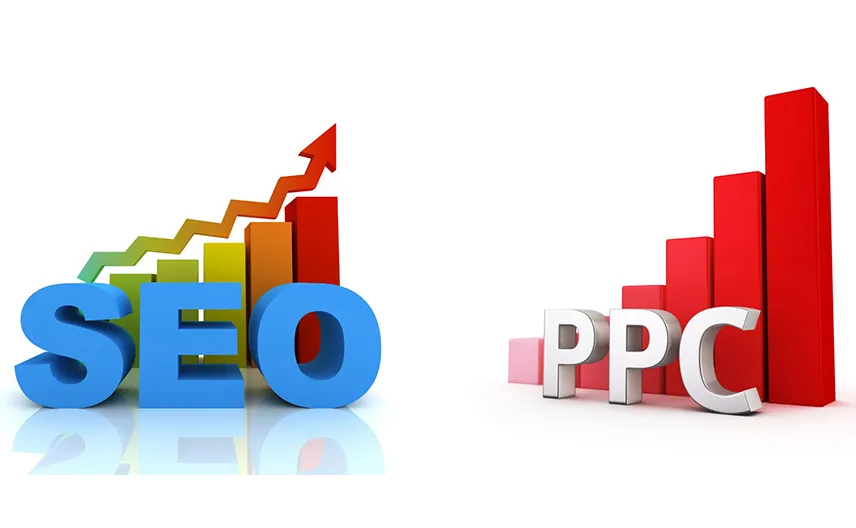-
Find Services
-
Find Agencies
- Submit Reviews
- Research & Surveys

SEO vs. PPC: Which Digital Marketing Strategy Works Best?
Companies are always looking to improve their online visibility and draw in new clients in the current digital environment. PPC and SEO are two of the best digital marketing techniques. Paid search advertising (PPC) gives firms instant visibility, while search engine optimisation (SEO) concentrates on organic search traffic. However, which tactic is more effective? The solution is contingent upon your timetable, money, and company objectives. This blog will discuss the distinctions between PPC and SEO, their benefits and limitations, and how companies may use both to their full potential in digital marketing. Understanding SEO: The Power of Organic Traffic Search engine optimisation (SEO) refers to optimising a website to be ranked higher in organic search engine results. SEO encompasses keyword optimisation, content marketing, link building, and technical optimisations to enhance site performance. Benefits of SEO Long-Term Benefits – Unlike paid search advertising, SEO activities generate traffic even after the initial optimisation. Cost-Effective – Because organic traffic is free, companies can save money instead of running PPC campaigns. Establishes Credibility & Trust – People trust organic search results more than paid advertisements, making SEO a good strategy for building brand credibility. Increased Click-Through Rates (CTR) – Research indicates that organic listings get more clicks than paid search marketing. Improved ROI in the Long Run – Although SEO is slow to yield results, its return on investment (ROI) often exceeds PPC's. Disadvantages of SEO Takes Time – SEO processes take months before one can witness substantial results. Requires Continuous Effort – Periodic updates, link building, and content optimisation are needed to sustain rankings. Algorithm Changes – Search engines regularly change their algorithms, necessitating businesses to change constantly. Understanding PPC: Instant Visibility Through Paid Ads Paid search advertising (PPC) enables companies to place ads at the top of search engine results by placing bids on keywords. Google Ads is the most popular PPC platform, providing companies instant visibility. Benefits of PPC Instant Results – Unlike SEO, PPC offers immediate website traffic. Targeted Advertising – Companies can target specific audiences based on location, interests, and demographics. Complete Control Over Budget – Advertisers can define daily budgets and manage their expenditures efficiently. Ideal for Promotions & Seasonal Campaigns – PPC is effective for product promotions, holiday shopping, and one-time offers. Best Placement in Search Results – PPC ads rank above organic listings, guaranteeing maximum visibility. Disadvantages of PPC Costly – PPC campaigns may be expensive, particularly for competitive markets. Short-Term Impact – Unlike SEO, traffic ceases once the budget is exhausted. Requires Expertise – Efficient handling of PPC campaigns involves expertise in bidding tactics and ad copy optimisation. When should you choose SEO as a business owner? SEO is the way to go if you are a business looking for long-term digital marketing strategies. SEO works best when: You want sustainable traffic growth. Your budget for advertising is limited. You aim to establish authority in your industry. You are willing to invest in content marketing and link-building efforts. When should you choose PPC as a business owner? PPC is an excellent choice if you require immediate results. It's best when: You have an expansive marketing budget. You require instant traffic for promotions or events. You are going after very competitive keywords that are hard to rank for organically. You desire precise control over your advertising campaigns. The Best Strategy: Combining SEO & PPC Rather than opting for SEO vs PPC, companies can utilise both methods to achieve maximum benefit. Here's how: Utilise PPC for Instant Traffic While SEO Puts On Gaining Momentum – Begin with PPC to generate traffic while developing long-term SEO approaches. Use PPC Data to Optimize for SEO: Inspect PPC keyword data to identify top-performing terms to incorporate into SEO copy. Retarget Visitors Through PPC – Utilize PPC campaigns to retarget visitors who have visited your website without converting. Optimise High-Converting PPC Landing Pages for SEO – Convert high-performing PPC landing pages into SEO evergreen content. Conclusion: SEO vs PPC – Which One Works Best? The decision between PPC and SEO depends on your company's goals. Search engine optimisation is the best option for steady development, while paid search advertising is the best option for immediate visibility. Nevertheless, combining the two tactics might give your company a competitive edge, guaranteeing immediate and long-term success. The best digital marketing approach for companies trying to dominate search results is a combination of PPC and SEO. By balancing the two strategies, businesses may optimise their online presence, generate traffic, and boost conversions.

How to Choose the Best Web Design Agency for Your Business?
The current scenario of digital hub, credibility, and attraction to customers are found through well-designed websites for the promotion of business development. Yet, with this wide availability, choosing a good web design agency seems quite a challenging task. Therefore, to succeed, a business should analyze its needs and select an agency that meets their goals. This blog is an insightful guide on the best design agencies and gives practical tips on how to select a good partner in professional website design. Following these guidelines ensures that your website becomes a valuable asset for your brand. Why Choosing the Right Web Design Agency Matters? Your website often becomes the first impression a potential customer has of your business. A site with a poor design will keep people away, but a professionally designed website will captivate an audience, communicate value effectively, and convert leads into customers. According to an Adobe report, 38% of users leave the website if the layout is not attractive or not easy to use. Consequently, the selection of the ideal agency will directly impact upon giving your website's functionality and beauty. Key Factors to Consider When Selecting a Web Design Agency 1. Define your business goals and website requirements Identify what you want before you speak to an agency. Do you want an e-commerce web platform, a portfolio web site, or a content-focused web site? This will allow you to know if the agency can help you achieve your objectives. Example: A company wanting to sell products online should focus on agencies that have experience building secure, scalable e-commerce platforms. Tip: List all the desired features, such as mobile responsiveness, SEO optimization, or integration with CRM tools. 2. Research and Shortlist Agencies Start by exploring the portfolios of potential candidates. Look for agencies with experience in your industry and a track record of creating engaging and user-friendly designs. Client testimonials, case studies, and Google reviews can provide valuable insights into their reliability and performance. Evidence: Clutch, a B2B reviews platform, reports that 72% of companies rely on client reviews and case studies when hiring agencies. 3. Assess Their Skills and Technology The best design agencies keep abreast of the latest trends and technologies. Make sure the agency is using modern tools, such as Figma, Adobe XD, and WordPress. Additionally, if your project has complex functionality, find out their level of expertise in web development frameworks like React, Angular, or Laravel. Market Trend: Business houses increasingly see value in agencies that provide all-around solutions, from web development and UI/UX design to post-launch support. 4. Evaluate Communication and Collaboration Clear communication is the essential factor for the success of any project. An agency that listens to your needs, offers proactive suggestions and provides regular updates is far more likely to deliver to your vision. Case Study: A startup collaborated with an agency which had weekly update meetings and ensured alignment throughout the process of design. This teamwork led to a website that was able to increase the generation of leads for the startup by 45%. 5. Compare Pricing and ROI While cost is a factor, cheapest does not always mean best. Focus on the value the agency provides, rather than just the price tag. Professional website design should have a high return on investment, enriching user engagement while driving conversions. Tip: Request a detailed proposal that breaks out costs and deliverables; avoid surprise charges. How to choose: Small Agencies or Big Agencies? Smaller Agencies Lack Resources Some may claim that small agencies do not have the resources to handle complex projects. While this may hold in some cases, boutique agencies are often more flexible and better able to be agile to client needs, in addition to giving a personalized touch. Refutation: Assess the experience of previous projects and reviews from clients to determine whether they can deliver. Big Agencies Are Too Expensive Larger agencies may have higher price tags attached to them, but on the other hand, they bring along huge expertise, the best of premium tools and a well-structured process that can be highly rewarding for companies with complex needs in the long run. Trends in Professional Website Design Keeping up with the latest trends will keep your website competitive and relevant. The following are the trends that will shape the future of professional website design: Mobile-First Design With more than 60% of web traffic coming from mobile devices, responsive design is no longer optional. Minimalistic Aesthetics Clean and simple designs with intuitive navigation are gaining popularity as they improve user experience. AI and Chatbots Integration The best design agencies integrate AI-driven features like chatbots to enhance customer engagement. Sustainability Eco-friendly web design that minimizes the site's energy consumption is becoming a priority for many businesses. Conclusion: Making the Right Choice Selecting the best web design agency is one of the most important decisions for your brand, which has an impact on your brand's digital presence and success in the business world. This can be done by defining your goals, researching agencies, evaluating their expertise, and considering collaboration and pricing to ensure you find the right partner. Remember that a professional website design is an investment in your business's future, and with the right agency, it will surely pay off. Take your time, ask the right questions, and prioritise more quality over a low cost. Whether you're a small startup or a large enterprise in operation, an agency that will help you construct a website beyond your expectations does exist.

How SEM Services Can Boost Your Online Presence in Weeks?
With the upgrowing and competitive digital scenario of today, staying alive and prominent online is as important as being there. Therefore, search engine marketing services play a vital role in rapidly increasing the visibility of businesses that are looking to make an online presence and visible in SERP. This can help them increase exposure in a quite significant number of ways, including reaching more potential customers, attaining higher search rankings, and really building your presence online. Moving to how SEM services can change the entire prospect of your online presence within just a few weeks, let's discuss this. Ways to Improve your Online Presence in Few Weeks 1. Understanding SEM Services: What They Offer SEM is such a digital marketing approach whereby efforts are directed towards placing your website in front of the searcher user who is actively searching for what you offer. SEM combines the power of both pay-per-click advertising and search engine optimization so as to amplify the visibility of your website on SERPs. The SEM services include: Keyword Research and Bidding: Identify the appropriate, high-value keywords and put them up for bid to ensure that your website reaches top possible visibility in the organic search results for that query. Ad creation and optimization: It is mainly about making ads attractive to the targeted audience. Engage clicks and interactions are the most critical outcomes from the ad. Campaign Management: Monitoring, adjusting, and optimizing campaigns for maximum performance and ROI. In any SEM campaign, a company can directly expose itself to potential customers who have a greater intent to purchase, thus immediately getting instant online presence and visibility. 2. Rapid Visibility with Targeted Ads Unlike organic SEO, which may take a few months to reach significant results, SEM places your business at the top of search results nearly immediately after launching a campaign. With paid ad placements, SEM ensures that your website is among the first to be seen by users searching for relevant keywords. The immediacy of SEM is particularly beneficial for New Product Launches: A brand can quickly launch new offerings to a niche target group. Promotion of Events or Sales: Companies can easily create buzz for time-sensitive events or sales and reach their target audience at the soonest possible time. Time-Sensitive Campaigns: Companies on a deadline can also ensure that they are seen at the right time. This speed of visibility is one of the significant reasons why SEM is preferred by brands when it comes to the need for immediate effects from their digital ad spending. 3. Enhanced Audience Targeting for Improved Online Reach SEM services enable you to target specific audiences based on demographics, interests, location, and even search behaviour. It is therefore the best form of search marketing since it is tailored so that businesses reach the right people at the right time, crucial for the maximization of engagement and conversion. Key targeting options include: Geographic targeting: This involves targeting prospective clients according to where they are—their location—this might be helpful in case the business is local-based. Demographic targeting will focus on age, gender, income, or educational levels, all closely associating with your brand's target customer profile. Behavioral Targeting: This relates to marking users according to their previous online behaviors, such as those that find and discover information. This will make it easier to target the ideal audience and prevent your ad spend from going to waste, ensuring effective investment in the marketing budget for the better utilization of your online reach. 4. Boosting Brand Awareness with Consistent Visibility Generally, the consumer will not click on your ad on first blush; frequent visibility of your brand name helps to create familiarity and trust in the long run. That is known as the "mere exposure effect," whereby an audience is more likely to trust and respond favorably to a brand with which it becomes familiar. SEM can give businesses continuous visibility at the top of search results, thereby aiding brand recognition. Consistent exposure via SEM campaigns works: Position the brand as a category leader. Build recall so prospects remember your brand when they have a related need. Over time, drive click-through and conversion probabilities higher. For firms looking to establish their presence in markets where there isn't much differentiation, SEM offers a highway to mass building of brand awareness. 5. Measurable ROI with SEM Services One of the key advantages of SEM is that it is trackable. While traditional forms of advertising cannot be measured to deliver direct returns, SEM makes sure that metrics on campaign performance are quite accurate. Businesses get to know clicks, impressions, and conversions, letting them measure their results to improve their strategy. SEM services help businesses: Make real-time adjustments: Tweaks improve performance, ensuring that ROI is the highest possible. Optimize spend: Now move budget allocation to those high-performing keywords or ad variations. Conversion path analysis: Understand which steps in the customer journey can be optimized. Businesses can make decisions based on measurable data and continually improve and refine their SEM strategy for maximum returns. This is the most effective way SEM can get you a fast, data-driven lift in online presence. 6. Gaining a Competitive Edge Through SEM For competitive industries, SEM places you on the first page of results. Since a majority of searches click on one of the first few links on a search results page most of the time, appearing high in the results list dramatically increases your chances of engagement. You can outrank with SEM: Bid on branded keywords: Some companies bid on competitors' brand names to attract users looking for other similar services. Adjust Fast: If your competitor changes strategy, you can adapt a new approach to stay ahead. By bidding on competitive terms, you can assure that even if your competitors get ranked organically for those terms, your ad can be shown ahead of theirs, giving you a fast online presence. 7. Reducing Cost Per Click Over Time with Campaign Optimization SEM services don't just offer win-after-win; there's much more to gain with the optimization process and gets cheaper by larger results over time. Professional SEM managers track campaign data in order to refine the bids, the ad copy, and the keywords, thus making processes more efficient. When your campaign becomes more data-rich, cost per click goes lower, so SEM becomes more economical in the long term. Optimization techniques: A/B Testing of Ads-It also consists of testing different versions of ads to determine which type of ad is more impactful. Adjusting Bids- Increas e or decreas e bids based on a device, location, or time to further optimize visibility of the ad Refining Keywords- Continuously refining keywords filters out the low-performing ones and increases priority on high-converting terms. With SEM, campaigns are never static. They constantly improve results and reduce costs with time. Conclusion A very useful SEM tool for the business is to grow an online presence faster. Targeted ads, rapid visibility, continuous optimization, and everything that can get the business in front of its target audience quickly helps maximize brand reach within just weeks. Increasing digital competition renders SEM as an excellent strategic advantage for brands to become more perceivable, attract traffic, and convert data into profitable amounts. Embrace SEM services to ensure that your business develops an online presence, thereby making you more accessible to customers and you better prepared in the digital marketplace.
